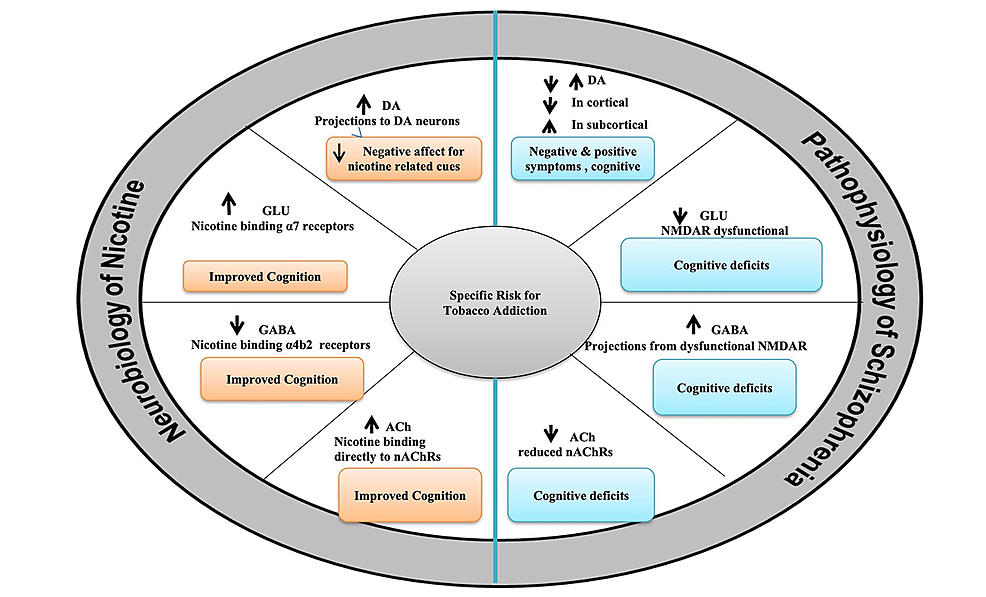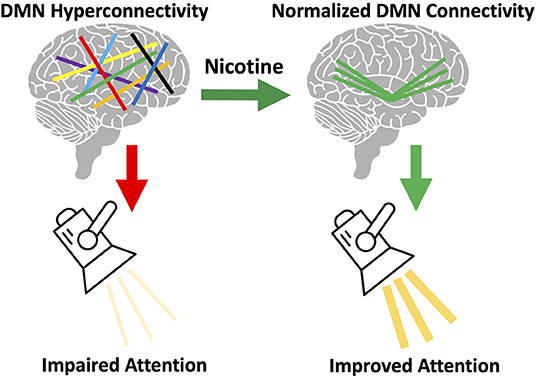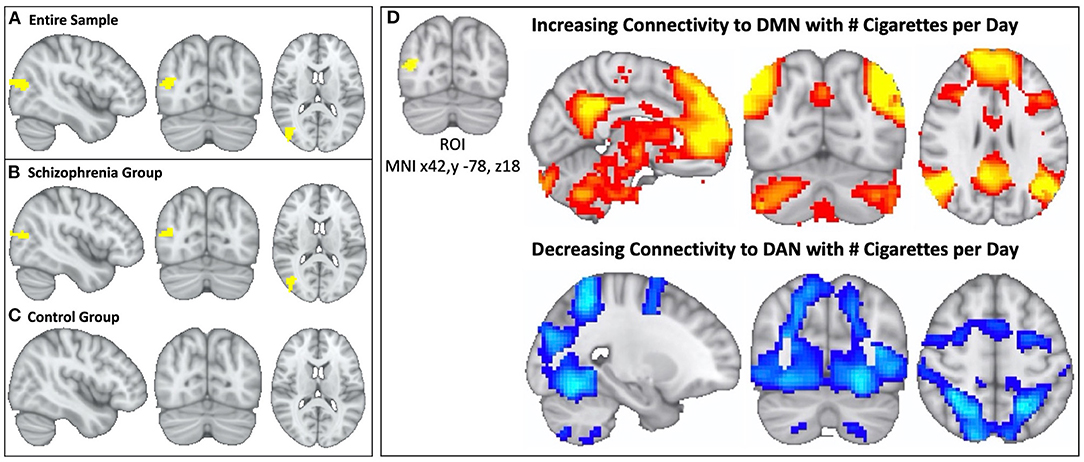Does Schizophrenia Lead to Smoking? Does Smoking Lead to Schizophrenia?
"Your brain processing power is divided into two. One is intellect, the other is cognition. Intellect tends to be more stable. Cognition is a more malleable or changing type of processing power of your brain: attention, short-term memory, decision-making. Things can fluctuate from day to day.""Smoking improves your cognition in the short term. It could be that they're trying to boost their cognition by smoking. Unfortunately, long-term smoking makes the condition worse. They already have cognition problems, and they're smoking. Patients with schizophrenia smoke maybe two or three times more often. It's compounding the problems they have."Dr. Lauri Tuomenin, neuroscientist, Royal Hospital, Ottawa
 |
Pathophysiology of schizophrenia and neurobiology of nicotine. Cureus |
Dr. Tuomenin at The Royal has set out to discover with the use of brain scans what precisely the relationship is between nicotine and and the complex medical condition known as schizophrenia. What is known is that people diagnosed with schizophrenia tend to smoke at rates much higher than is the case within the general population. Schizophrenia is known by disturbing symptoms such as hallucinations and delusions and 'hearing' voices; the source of the illness is believed to be both genetic and environmental, affecting roughly one in a hundred population with an initial episode occurring at a point between the teens and mid-20s.
 |
Part of the challenge facing the researchers is to determine whether smoking leads to schizophrenia or is a by-product of the mental illness in an effort to control its symptoms. Two theories are current; that smoking is a schizophrenia risk factor, the other, that those with schizophrenia smoke in an effort to self-medicate, in hopes of focus acuity. Those suffering from schizophrenia often experience problems with attention, manipulating information, and decision-making. Even before the first episode of psychosis has been experienced in a schizophrenia patient, cognitive symptoms can be present.
Anti-psychotic drug treatments, in use for 70 years, have proven effective therapy in treating t he condition; however these drugs do nothing to improve cognition. Which is why researchers hope to discover more with brain imaging to help understand how nicotine affects brain processes. Brain images of about fifty people are to be part of the research by Dr. Tuomenin and his research colleagues; ten to twenty of whom would be habitual smokers without schizophrenia.
The cholinergic system is the focus of the research, for the vital role it plays in memory, digestion, control of heartbeat, blood pressure, movement related functions -- all of which are affected by nicotine. Positron emission tomography (PET) scans make use of a small portion of radioactive tracer to create a picture showing t he function of a specific brain process, and the MRI uses a strong magnet and radio waves to capture the detailed pictures of the brain.
 Starting with psychological and cognitive tests, followed by two scans, one of working memory testing how the brain functions, and another of the cholinergic system using the PET scans, the study takes about ten hours for each participant profile. Ironically enough it has become difficult to recruit smokers who are otherwise healthy for such studies given that the population of those who smoke is on the decline. As well, the researchers are searching for people who, while smoke or vape, do not use cannabis, since the focus is on nicotine.
Starting with psychological and cognitive tests, followed by two scans, one of working memory testing how the brain functions, and another of the cholinergic system using the PET scans, the study takes about ten hours for each participant profile. Ironically enough it has become difficult to recruit smokers who are otherwise healthy for such studies given that the population of those who smoke is on the decline. As well, the researchers are searching for people who, while smoke or vape, do not use cannabis, since the focus is on nicotine.Cannabis on the other hand, has an altogether other relationship with schizophrenia since its use can trigger schizophrenia in people genetically predisposed, particularly those who use it frequently, use potent products, or began using the drug at a young age. Which still leaves a number of unanswered questions relating to the relationship between smoking and schizophrenia. While the smoking rate has declined markedly in the general population, no indication exists that schizophrenia prevalence has dropped as well.
Some people self-medicate with nicotine to deal with the side-effects of antipsychotic medications; anxiety and restlessness. Those with schizophrenia tend to live isolated lives that tend to encourage nicotine consumption. Connections abound, those with schizophrenia end up with shorter life expectancies, partially attributable to excessive smoking. And then there are separate questions respecting how new ways to consume nicotine such as vaping, may affect schizophrenia risk.
Hopes are high for the discovery of a new class of drugs to treat the cholinergic system, to help those with schizophrenia with hallucinations and delusions, and also have the benefit of effectively treating the issues of cognition.
"We know much less about vaping because it's such a new thing. The way you smoke and the way you vape is different.""People smoke a cigarette and then they wait for another. Vaping is much more constant."Dr. Lauri Tuomenin
Labels: Attention, Cognition, Cognitive Impairment Alleviation, Decision-Making, Schizophrenia, Smoking

0 Comments:
Post a Comment
<< Home